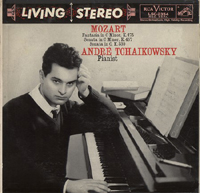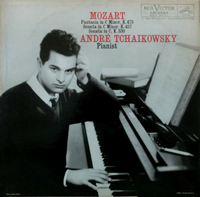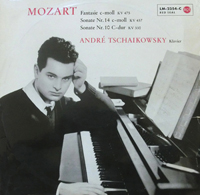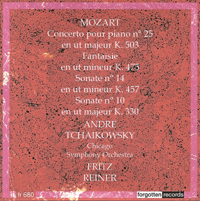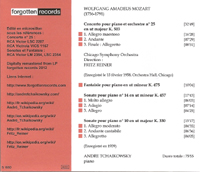|
RCA
Victor LSC-2354 (Stereo) [also remastered and released on CD]
RCA Victor
LM-2354 (Mono)
RCA Victor LM-2354-C (Mono) (German)
Forgotten Records fr-680 (Stereo) (Click
Here for purchase information)
RCA/Sony
Classical 88985470142 (CD box set, CD3)
Mozart Fantasia in C minor (K475)
Mozart Sonata No. 14 in C minor (K457)
Mozart Sonata No. 10 in C major (K330)
Music/MP3
Fantasia
in C minor (K475)
Adagio
/ 01_mozart_fantasia_k475.mp3
-or- 
Sonata
No. 14 in C minor (K457)
1.
Allegro / 02_mozart_sonata_14_molto_allegro_1st.mp3
-or- 
2. Adagio / 03_mozart_sonata_14_adagio_2nd.mp3
-or- 
3. Assai
Allegro / 04_mozart_sonata_14_assai_allegro_3rd.mp3
-or- 
Sonata
No. 10 in C major (K330)
1. Allegro
/ 05_mozart_sonata_10_allegro_moderato_1st.mp3
-or- 
2.
Andante Cantabile / 06_mozart_sonata_10_andante_cantabile_2nd.mp3
-or- 
3.
Allegretto / 07_mozart_sonata_10_allegretto_3rd.mp3
-or- 
Review
on MusicWeb International Website
A review of the CD reissue of this record by Forgotten
Records (fr-680)
appeared on the MusicWeb
International website on March 4, 2014. Written by Stephen Greenbank,
this review includes: "The C minor Fantasie K475 was published
in December 1785 together with the Sonata in C minor, K457. The two
works are often paired in performance, as they are here. The Fantasie
has many different changes in tempi and traverses a spectrum of modulations.
The pianist carries this work off superbly, maintaining the line and
narrative throughout the small dramas."
Read More.
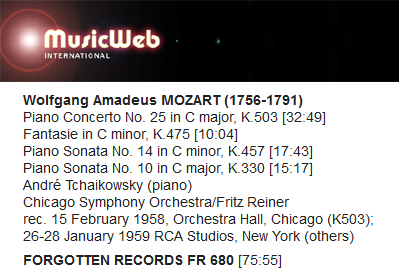
Recording
Date(s):
26,
27, 28 January 1959
Recording
Location:
RCA
Studios, New York City, USA
Release
Date:
August,
1959
Reissue
Date:
May, 2012 by Forgotten
Records
Also includes Mozart - Piano Concerto No.
25 (K.503)
Known
Details:
André
was in the USA from January through April 1959 fulfilling concert dates
set in the previous season, and completing three recording sessions
for RCA: January, March, and April. This recording is from the January
1959 recording sessions. At the end of April 1959 André returned
to England and never played another recital in the USA for the rest
of his life. And he was just 23 years old. He was dropped by his concert
manager in the USA, Sol Hurok, he was dropped by RCA as a recording
artist, and André refused any and all invitations to play in
the USA.
André's
future manager in Europe, Terry Harrison, of Harrison/Parrott, suggests
what went wrong for André in the USA:
"André
just couldn't stand the way America worked, with society ladies, the
rich, and the newly rich. He was expected to be more than a pianist.
He was supposed to play and have a public profile while in town, and
felt that Hurok had sold them on the fact that he had this unfortunate
background. André felt he was being booked on his curiosity
value rather than his music value. This coupled with the parties and
socializing absolutely turned André off. This was because he
felt his personal and musical integrity were being compromised. When
André felt he was being compromised, he started to look for
trouble.
"Hurok
went to André and said, 'What in the hell are you doing?' It
was at that point that André decided that he didn't care about
blowing it, and continued to blow it for the rest of his American
tour. That was the end and he didn't want to go back."
RCA producer,
John Pfeiffer:
"My
job was to start the whole ball rolling by discussing with all the
principals and merchandising people the repertoire for specific artists
that we have on contract, then set up the recording session, supervise
them musically and technically, work with the artist to choose the
master tapes, edit the tapes, do the mix-down process, liner notes,
and everything through to final production.
"In
André's case, he wasn't happy with the work that he did. Usually
if the artist in not happy with his recordings, then they're not issued.
André didn't make any money for RCA because he didn't return
to the US often enough. When someone is not in evidence, their record
sales are not good. The quality of the recording really has nothing
to do with it, particularly a classical record. It's really up the
artist himself."
This recording
session also included the following works that were never released:
Mozart
- Sonata No. 11 in A major (K331)
Mozart - Sonata No. 12 in F major (K332)
Mozart - Sonata No. 13 in B flat major (K333)
|
